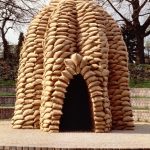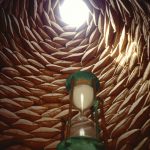I N V I S I B L E N A T U R E, Ludwig Museum für Internationale Kunst, Aachen, Germany, 1994
Director: Wolfgang Becker
Organization: Ludwig Museum für Internationale Kunst, Aachen, Germany, The Japan Foundation
In cooperation with: Ministry of Culture of the Czech Republic, Japanese Embassy of the Czech Republic and Hungary, Nanjo and Associates, Carosso International
sandbags, barbed wire, hourglass, water
14 x 13 x 13’ / 430 x 400 x 400 cm
Phalz kapelle was constructed of two thousand military sandbags generally reserved for emergencies to erect a structure. The form of the dome was inspired by the octagonal Phalz Chapel, one of the oldest and most important buildings in Aachen that dates from the reign of Charlemagne (768-814).
In Aachen, mineral water has also played an essential role, so the element of water was included in the artwork by creating a pond in front of the dome that quietly reflected its distinctive arched surfaces. To complete the installation, Nagasawa placed an hourglass within the domed structure. Filled with sands of two distinct colors from the former East and West Germanys, respectively, the inevitable mixing and mingling of sands in the hourglass represented the consolidation of political power inherent in Germany’s unification.


